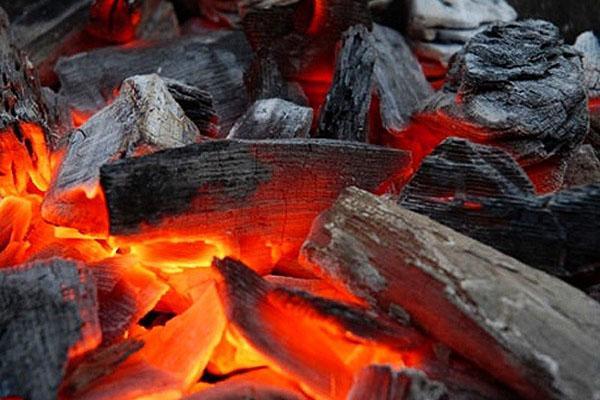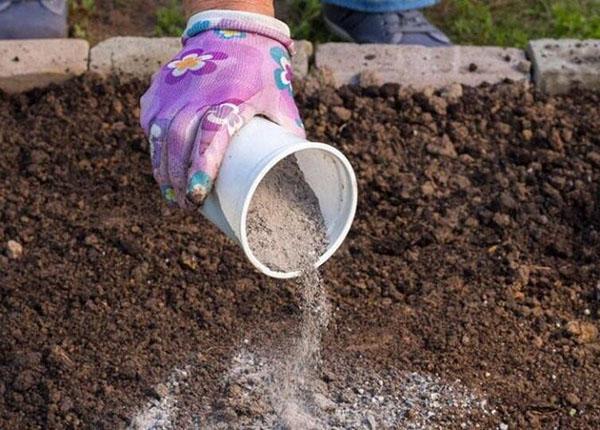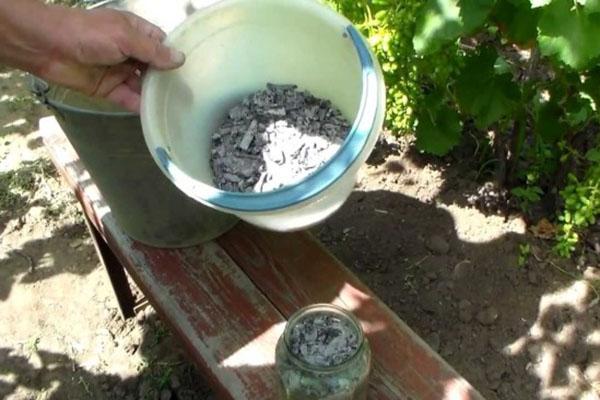Charcoal as vegetable garden fertilizer
 Charcoal as a fertilizer for the garden is a useful substance that significantly increases yields, while not harming the environment. This is an environmentally friendly product that improves soil properties, promotes the absorption of moisture and nutrients by plants, is suitable for different types of fruit and decorative crops... However, it is important to understand how to choose the right raw materials for different types of soil and plants, so that they bring maximum benefit.
Charcoal as a fertilizer for the garden is a useful substance that significantly increases yields, while not harming the environment. This is an environmentally friendly product that improves soil properties, promotes the absorption of moisture and nutrients by plants, is suitable for different types of fruit and decorative crops... However, it is important to understand how to choose the right raw materials for different types of soil and plants, so that they bring maximum benefit.
Method of obtaining and composition of coal

The composition of charcoal depends on the type of wood, the same factor affects its value as a fertilizer:
- Ash and coal from hardwoods are a valuable source of potassium. These are oak, maple, poplar and especially elm.
- The material obtained by burning soft types of trees (conifers, alder, aspen) contains a much lower percentage of potassium. it
- Birch - despite the fact that it belongs to soft breeds, produces a huge amount of not only potassium, but also calcium and phosphorus.
Charcoal as a fertilizer for both vegetable gardens and indoor plants is one of the simplest and most affordable ways. Young trees are more valuable for its preparation, as they contain more nutrients.
Useful properties of charcoal and ash
 The use of charcoal is a method discovered by the Indians of Peru. In cultivated soils, they added products of combustion of wood, which was mined in the forests. As a result of this simple procedure, an increase in yield indicators and an improvement in the condition of cultivated plants were noted. Despite the wide range of purchased fertilizers, wood ash and coal remain popular. These are simple and environmentally friendly additives that are fully absorbed by plants and do not harm the crop.
The use of charcoal is a method discovered by the Indians of Peru. In cultivated soils, they added products of combustion of wood, which was mined in the forests. As a result of this simple procedure, an increase in yield indicators and an improvement in the condition of cultivated plants were noted. Despite the wide range of purchased fertilizers, wood ash and coal remain popular. These are simple and environmentally friendly additives that are fully absorbed by plants and do not harm the crop.
The main purpose for which charcoal is used is to saturate the soil with useful substances. Its various types contain potassium. In smaller quantities, you can find calcium, phosphorus, boron and other minerals necessary for the growth, flowering and fruiting of plants.
The useful properties of coal are determined by its main properties:
- chemical inertness - wood after combustion does not come into contact with other substances, therefore it can be stored in the soil for a huge number of years;
- high ability to absorb any substances - coal absorbs excess moisture, preventing swampiness of the territory, as well as aluminum compounds that affect the acidity of the soil;
- the presence of a huge number of pores - this feature increases the activity of coal.
To understand if charcoal can be used as a fertilizer, it is important to pay attention to the composition of the soil. This substance significantly reduces their acidity, so it is better not to use it for alkaline soil. Fertilizer is suitable for most varieties of soils, except for alkaline soils. Thanks to its introduction, the soil becomes softer and looser.It improves gas exchange, stimulates the development of beneficial microorganisms.
Expert advice
 Charcoal can be used for the garden, vegetable garden, ornamental and fruitful plants. It is added after dilution in water, in an amount of 1 to 3 glasses per 1 m2 surface. The exact concentration, method and time of application depend on the breed or type of plant.
Charcoal can be used for the garden, vegetable garden, ornamental and fruitful plants. It is added after dilution in water, in an amount of 1 to 3 glasses per 1 m2 surface. The exact concentration, method and time of application depend on the breed or type of plant.
Experienced gardeners have a few tips to help you get the most out of a simple natural fertilization procedure:
- Coal and ash affect the acidity of the soil towards the alkaline side. Some plants (blueberries, cranberry) prefer neutral and slightly acidic soil, so the introduction of charcoal may not only not help the trees to grow and develop, but can also cause dangerous complications.
- It is better to use ash and fine dust as fertilizer. In this form, all useful elements are absorbed faster by the soil and are used for the development of beneficial microorganisms. However, coarse coal is also good for soil and can be used for cultivated and ornamental plants.
- Coal is used only in dry form. After contact with water or storage in a room with high air humidity, it partially loses its absorbent properties and a huge percentage of useful substances.
- Before using charcoal as a fertilizer, it is recommended to dry it in the sun. So it will be better absorbed and will not lose its beneficial properties.
It is better to use not coal, but ash and coal dust as fertilizer. In this form, the substance does not lose its beneficial properties. It becomes more convenient and spreads easily in the soil layers.
Charcoal as a fertilizer for the garden - method of application and dosage
 Ash and charcoal can be used as fertilizer for the garden in two ways. The first is scattering the substance over the soil surface - it is then absorbed with precipitation. You can also add crushed coal or dust to the water to watering plants... The dosage does not have to be calculated as accurately as for purchased mineral fertilizers. It is enough to add 1 glass of ash or coal under the cabbage. For most plants - 2 cups, and for peppers and tomatoes, you can take 3 cups of fertilizer.
Ash and charcoal can be used as fertilizer for the garden in two ways. The first is scattering the substance over the soil surface - it is then absorbed with precipitation. You can also add crushed coal or dust to the water to watering plants... The dosage does not have to be calculated as accurately as for purchased mineral fertilizers. It is enough to add 1 glass of ash or coal under the cabbage. For most plants - 2 cups, and for peppers and tomatoes, you can take 3 cups of fertilizer.
Charcoal is a simple and affordable fertilizer. It can be used for garden and horticultural crops as well as flower and pot plants. It is obtained by burning wood. It must be of high quality, without the addition of rubber and other impurities. It significantly increases the yield of tomatoes, cucumbers, peppers, legumes, as well as fruit trees. Charcoal is no less useful for flowers, especially for garden roses.